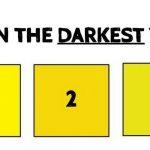Can you get at least 17/20?Only 2% Of Americans Got At Least 10/20 In This Confusing US Capitals Quiz
Quiz: 5% Of Americans Got At Least 10/20 In This Confusing US Capitals Quiz
Are you a movie buff who can recognize actors from different countries? Test your knowledge with this fun quiz that challenges you to identify whether the actors are British, American or Australian.
The quiz features a mix of well-known and lesser-known actors from the three countries. You'll need to pay attention to their accents, mannerisms and other clues to determine their nationality.
Some of the actors you'll encounter in the quiz include Hugh Jackman, Kate Winslet, Tom Hiddleston, Meryl Streep, Cate Blanchett, and many more. You'll have to think carefully about each actor and their background to make the right guess.
Whether you're a fan of Hollywood blockbusters, indie films or British dramas, this quiz is sure to test your knowledge and keep you entertained. So, grab a cup of tea or coffee, sit back and get ready to put your movie knowledge to the test!





